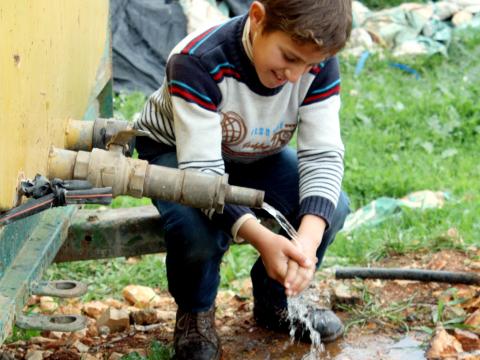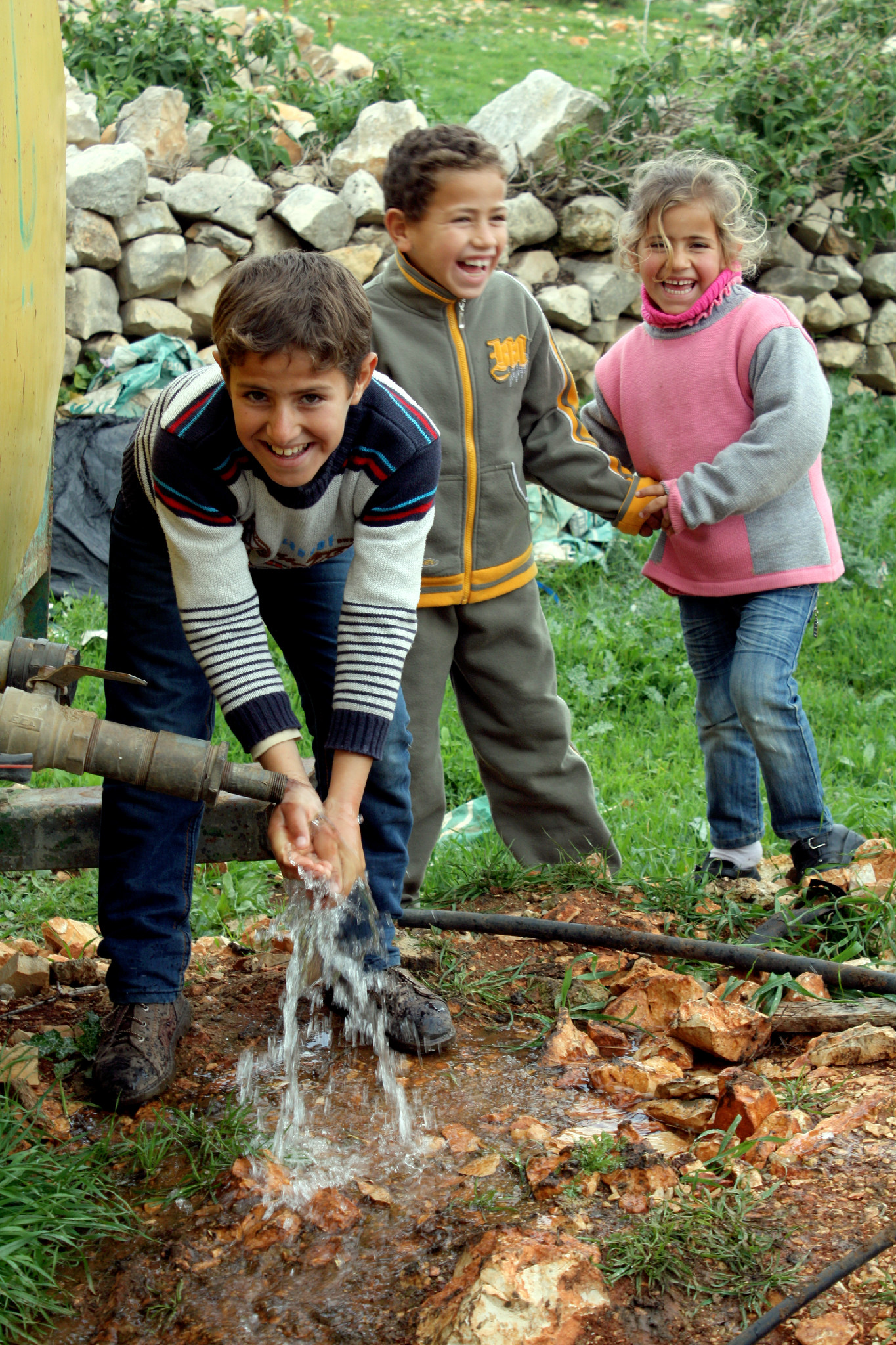Hope springs for one shepherd and his family on the International Day of Water

Sixty six kilometres from Jerusalem lies the Nablus governorate in the West Bank. In the northern part of Nablus is a small mountainous village with no springs or fountains or main water network. This village is one of 134 villages that are home to about 191,000 Palestinians who live without a running-water network. There are several other communities in the West Bank that live in similar conditions with no access to a water network.
In the West Bank, unemployment stands at 20.4% and 17.8% of the Palestinian population is living in poverty. In the Nablus governorate, the area is plagued by unrest, settler violence and water scarcity. The issue of water scarcity is not a result of the absence of water resources, as just south of this area lies Israel’s largest water aquifer. Although the only source of water for Palestinian residents in the West Bank, Israel uses 80% of its water, leaving only 20% for Palestinians. But in this dismal scene lies hope. One family of seven has a reason to celebrate on this International Water Day.
NOT ENOUGH TO DRINK
The majority of water resources in the West Bank are controlled by the Israeli authorities. 28 of the 42 Israeli water drillings in the West Bank provide Israel with about 32 million m3 of water a year, the majority of which is allocated to illegal Israeli settlements. Each year Israeli settlers in the West Bank are provided with 45 million m3 of water from these drillings, in addition to water from the Jordan River, treated wastewater and artificial water reservoirs. In total, the allocation of water to the 9,400 settlers in the West Bank is one-third the quantity of water accessible to the remaining 2.5 million Palestinian residents of the West Bank.
As a result of this control of water sources, some Palestinian wells have dried up and led to a further drop in the amount of water available to residents. Furthermore, due to Israel’s control of land area, the equal distribution of water to Palestinian communities in and outside the area is prevented.
Daily water consumptions for household and municipal use in communities with a central running-water network in West Bank is more than 3.5 times less than those of towns and local councils in Israel. With the high rates of unemployment and poverty in the West Bank, Palestinian communities requiring water for drinking, bathing, cleaning and often the watering of animals and crops, often find the price of buying water-tankers at around three to eight dollars per cubic metre -a heavy family burden.
THE STORY OF A SHEPHERD
Thirty-seven year old father of five Ala’ Al Aqra', has been working as a shepherd for most of his life in the fields and mountains of northern Nablus. With his wife, he and his family live in a small home with a stable for their sheep under their home. They have been raising a herd of sheep and selling their dairy products at the local market. With the high cost of purchasing water in tanks due to the lack of a water network in their village, Ala’ was being forced to pay 30 NIS (approximately US $8) a day for the necessary cubic metre of water for his family and sheep. With a meagre daily income of 50 NIS (approximately US $13), this was not a viable option and Ala’ and his family were planning to sell their sheep.
"We had to stay long without water when the tank was over until we found a water provider, ordered water and brought it home,” explained Ala’s wife, 30-year-old Ikhlas.“Unfortunately that water was enough for only two days. That forced us to economize a lot in using water and use it only for drinking and very little for showering.”
WORLD VISION BRINGS JOY TO NABLUS FAMILIES
In 2012, World Vision Jerusalem-West Bank-Gaza (JWG) began working in Ala’s village as the first of eleven to improve water access and quality for families dependent on water cisterns and with no access to water networks. Ala’ and his family were one of six families in the village to receive a water well, constructed by World Vision. After testing the village drinking water, chlorine tablets were provided and awareness sessions on water management and safety were provided to community residents. World Vision JWG plans to continue constructing water wells for more families like Ala’s to help improve their quality of life.
Moayyad Badran, Head of the Environmental Department at the Palestinian Ministry of Health, says that this project has transformed lives. "The Ministry of Health always encouraged such activities as the Ministry cannot cover all the remote areas with needed chlorine as well as provide residents with practical training on how to sterilize their household water cisterns, such as what was implemented now by World Vision."
World Vision JWG North Nablus Area's Community Development Officer Amani Sabani states that the impact of this project on the lives of these families is clear. “This village is the only village with no water network in the areas where we work in northern Nablus. We received a huge number of applications when we announced this project, and the six families who were chosen truly felt very blessed to have been selected.”
HOPE AMIDST DESPAIR
For Ala’ and his family, the project has changed their lives forever. They now collect rainwater in the well throughout the winter and part of the summer. Even when it is necessary to buy a tank of water, the family now has the space to store the larger tanks which are cheaper at 12 NIS (about US $3) than the smaller ones. With enough water to shower more often and water the sheep, as well as clean their home, much has changed. “Now, our suffering is over. We have water most days of the year,” says Ikhlas.
As for Ala’, he has not only gained monetary support but much more. “I used to have to spend a lot of time bringing water from the nearby village. This project has not only provided for me and my family financially but also provided me with additional time to spend with my family and my sheep.”
Ala’s eldest son 11-year-old Izzaldin, who is sponsored with World Vision, says that times before the new well were difficult ones. "Our life was much harder before,” says Izzaldin. “Buying water cost too much for my dad and it was a big strain on him and needed a lot of physical work. Dad had to work harder to always fill the tank,” he explained. “Now we have water all the time, and it is much cleaner!"
World Vision Jerusalem-West Bank-Gaza seeks to impact the lives of over 200,000 children through its programmes and directly benefits the lives of over 168,000 people in 117 communities throughout the occupied Palestinian territory. With its Area Development Programmes in North, East and Central Nablus, World Vision works with 133 community based organizations and schools in Nablus to empower families and children to become agents of change for a better future. World Vision seeks to ensure that all families and children are cared for, protected and participating.
Sources:
1) B’tselem- The Israeli Information Center for Human Rights in the Occupied Territories, January 2011
2) B’tselem- The Israeli Information Center for Human Rights in the Occupied Territories, May 2011,
3) B’tselem- The Israeli Information Center for Human Rights in the Occupied Territories, January 2011,
